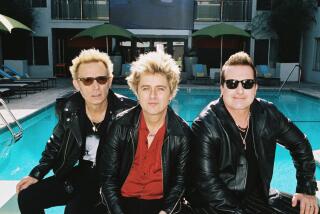Book Review : The Transformation of Maddy Brewster
- Share via
The Saviors by Helen Yglesias (Houghton Mifflin: $17.95; 306 pages)
The women in Helen Yglesias novels are heroines in the strict sense of the word, growing in courage and stature as the story progresses, confronting and triumphing over extreme adversity. Although Maddy Brewster herself in “The Saviors” is no exception, the context against which she’s seen is the hermetic world of a quasi-religious movement; a blurry background of briefly glimpsed characters, petty intrigue, and muddled theory. From the beginning, she seems misplaced, a gem in an overwrought setting.
When we first see her, she’s marching in a peace demonstration on a hot June day; “a handsome elderly woman, waving a silken standard and calling out slogans vigorously, but in the instant that she tripped, she collapsed into a pitiful old creature.” For a few moments, Maddy is lost in a fugue, but her confusion soon passes and she’s restored to her usual competent self. The senior marchers have been installed in a suite at the Boston Ritz-Carlton, a luxury paid for by one of their number, Victoria Younger, still flamboyant in her 80s, and it’s there that we’re introduced to Maddy’s husband and comrade in a lifetime of good causes, Dwight Phillips; to the group’s superannuated leader, Arthur Brownson, and to Maddy’s friend Elena Dasinov, another survivor of an extraordinary shared past.
“The Saviors” is a story of sexual passion among members of a mystical sect established by English idealists and led by the charismatic Indian guru, Vidhya. The novel shifts between past and present, showing these people as youthful disciples and now as aging radicals.
Conflicting Personalities
Sent by her philosopher father to study music under the auspices of this group, Maddy Brewster sails for England in 1927 at the age of 16, at once finding herself at the center of a web of conflicting personalities. Strikingly beautiful and physically precocious, Maddy is nevertheless utterly naive, unprepared for the sophisticated decadence of the society’s leaders.
Though she embarks upon this journey from Iowa City where her father teaches at the university, we soon learn that the Brewster family has completely reinvented itself. One day Maddy was Bessie Bernstein, living in a Bronx tenement, her father a delicatessen counterman studying at City College; the next she was on her way to the heartland--”America, the real real thing,” her home “an American dream of a house”; her parents suddenly Professor and Mrs. Brewster. Once in Iowa, Maddy adapts to her new identity with remarkable facility, quickly acquiring the flat Midwestern accent, dutifully attending dancing school, French class and Bible lessons; learning to ride horseback and ice skate, joining the 4-H club, volunteering for the Little Friends of the Poor, diligently applying herself to the music for which she shows considerable aptitude.
If this radical transformation took an inevitable toll, there is little evidence of maladjustment on Maddy’s part; only a sentimental nostalgia for the vitality of New York street life--”the fierce games of ring-a-lievio or jacks, the evening stoop talk of how babies were made and born, or whether there was a God or not.” Bessie Bernstein simply disappeared, resurfacing only as Maddy Brewster’s liberal conscience, reacting with instinctive sensitivity to ethnic slurs. Her parents have become adherents of the Universal Brotherhood fellowship, her intellectual father a leader of the American branch.
Sexual Scandal
Her education begins aboard ship, accelerating as soon as she’s installed in the sect’s London headquarters. There she learns that the nominal head of the society is embroiled in a sexual scandal involving the 18-year-old Indian Vidhya, a young man of astonishing physical beauty being groomed by the society as a messiah. Although all the members of the cult, regardless of gender, are in love with Vidhya, Maddy almost immediately becomes his favorite. Her musical education is soon abandoned, and she becomes his secretary, confidante, and within a remarkably short time, his lover in all but the most technical sense.
“The Saviors” traces the fortunes of the society through various vicissitudes, concentrating upon the years of its ascendancy during the 1930s, exploring the convoluted relationships of the members to each other and to the narcissistic young man they have chosen to represent them. The focus of the novel is the complex emotional connection that waxes and wanes between Maddy Brewster and Vidhya, a passion that for all its intensity, never seems quite plausible enough to support the lofty superstructure of the plot.
We are given only the merest hints of the society’s basic tenets and few clues to its wide appeal. Vidhya’s speeches begin with childish analogies of birds and flowers, the substance, if any, left to our imagination. Tricks of light and wind surround him with the illusion of a column of ice, of crystal, of flame; bedazzled members of his audience see rivers of gold; flurries of petals or ashes.
“Some were entirely seized by their own sensation of melting, dissolving, of fiery substances or icy elements piercing their bodies.”
Veering from lyrical rhapsody in the love scenes to chilly detachment and outright satire in the descriptions of the various eccentrics who belong to the society, “The Saviors” is curiously uneven in tone; the compelling study of Maddy Brewster’s journey from girlish innocence to worldly resignation often subsumed by the demands of a plot struggling to explain the anatomy of faith and the personalities of those who are drawn to such cults.
More to Read
Sign up for our Book Club newsletter
Get the latest news, events and more from the Los Angeles Times Book Club, and help us get L.A. reading and talking.
You may occasionally receive promotional content from the Los Angeles Times.






